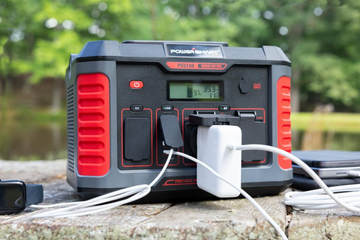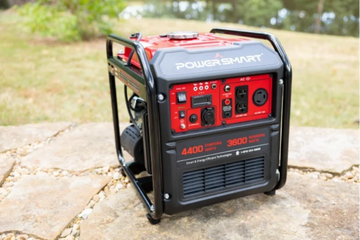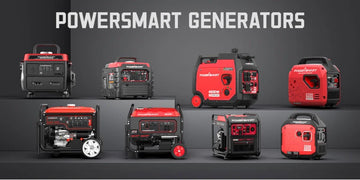The Science Behind Temperature Effects on Gasoline Portable Generators
by zq J on Oct 17, 2024

Understanding Gasoline Portable Generators
Introduction to Gasoline Small Generators
Gas-powered small generators are devices that are frequently utilized for a range of purposes, in homes and recreational settings. These generators run on gasoline. Serve as a source of electricity for running devices during power outages or when in remote areas. Their portable nature and user-friendly design make them a popular choice among homeowners and outdoor lovers looking for an affordable power solution. Thanks, to their design and use of four-stroke engines...
Overview of PowerSmart Products
PowerSmart is recognized for making notch gasoline generators tailored to various customer requirements – be it, for home backup or outdoor activities usage. Their portable generators usually come with a gas engine such as the 144cc OHV 4-stroke engine. This configuration guarantees performance while also being energy efficient. Moreover, PowerSmart generators are furnished with user elements like recoil starters and auto chokes which make starting and operating them a breeze for individuals less familiar, with portable generators.
Temperature Effects on Generator Performance
How Temperature Impacts Engine Efficiency
The way gasoline generators work can change a lot based on the temperature, around them. When the temperature goes up and down the engine might not work well because the fuel might not burn all the way or flow right. For example, in weather, the gasoline might not turn into vapor easily which means it doesn't burn completely and makes less power. In hot temperatures, the fuel could get stuck in vapor form and block the flow, which can mess up how well the engine runs. Knowing about these things is important to keep your generator working its best and staying reliable, in weather conditions.
Cold Weather Challenges for Generators
Using gasoline generators, in weather can be tricky because the cold temperatures can make the gasoline thicker and harder for the engine to use efficiently. Causing problems with starting and reduced power output. Moreover, the cold weather can cause wear and tear on engine parts since the oil doesn't flow well which could shorten the generator's lifespan. To address these challenges people should think about using winter-grade gasoline or additives made for performance, in temperatures.
Hot Weather Impact on Generators
In contrast, elevated temperatures can impact the efficiency of gasoline generators. In manners. During weather, there's a likelihood of a vapor lock occurring as the gasoline may vaporize rapidly in the fuel lines. This vaporization can result in fuel shortage and engine shutdown, which can pose a challenge when using the generator, for periods. Moreover, high ambient temperatures can also lead to overheating potentially jeopardizing the engine's durability if the generator doesn't have cooling systems in place. During weather, users need to make sure there is good ventilation and adjust their routines to keep things working smoothly.
Best Practices for Operating in Extreme Temperatures
Preparing Your Generator for Cold Weather Use
When you're getting your gasoline portable generator ready to use in cold weather conditions¸ it's important to think about the type of fuel you're using¸ Winter grade gasoline is designed to work in temperatures¸ helping to prevent issues caused by thicker consistency¸ Additionally¸ adding a fuel stabilizer can boost the ignition and performance of the fuel, in cold weather¸ Before starting the generator¸ make sure to check the oil viscosity as well¸ Using oil that's made for cold temperatures will help with better circulation and lubrication while it's running.
It's crucial to keep the battery charged if your gas generator has a start feature because cold weather can weaken battery power and starting to do so using an engine block heater when possible can heat the engine before starting and reduce the chances of struggling with cold starts. Additionally protecting the generator, from weather conditions is essential to prevent fuel and starting problems.
Ensuring Optimal Functionality in Hot Climates
In environments where gasoline-powered portable generators are used frequently keeping them in shape is vital, for their durability over time. A good way to maintain their performance is by keeping an eye on the engine temperature during operation. If the generator starts to get too hot it's important to act by reducing the workload, such as switching off some devices to ease the strain, on the system. Proper ventilation is key; users should make sure their generator is positioned in a spot or sheltered area that allows for airflow. This helps lower the chances of overheating. Ensures a cooling setup.
In weather conditions, it's important to stay on top of checking and changing the engine oil regularly since high temperatures can speed up the breakdown of oil properties over time. To keep the engine running efficiently in these conditions opt for a quality synthetic oil that suits the temperature range your vehicle operates in. Furthermore, it's crucial to inspect the fuel lines for any signs of damage or vapor lock to avoid issues, with the fuel supply due to overheating. In cases of temperatures, you might want to consider using fuel additives as a way to stabilize the gasoline and prevent problems, like vaporization.
Conclusion: Maintaining Optimal Generator Performance Year-Round
To keep your gasoline generator running smoothly all year long and performing at its level possible requires users to stay ahead with maintenance and operational practices. Regular maintenance tasks, like changing the oil and monitoring fuel quality well as checking air filters can help guarantee that the generator functions effectively no matter the weather conditions. Moreover, a solid awareness of the challenges related to varying temperatures during summer or winter empowers users to predict and address any problems promptly.
One important tactic is to choose the type of gasoline, for your generator. Adjusting your fuel choices according to the season can have an impact on the reliability of your generator. For example; Using winter grade gasoline or additives can be helpful, during weather. In climates, high-octane fuels might work better. It's also an idea for users to learn about any upgrades that could enhance their home gasoline generators' performance. Simple operational tweaks can optimize how well it runs.
In the end managing how temperature affects gasoline generators well results in improved efficiency, reliability, and lifespan giving users power solutions, for different uses all year round. By incorporating these methods into their generator maintenance routines users can experience the benefits of their gasoline generators in harsh temperature situations ensuring they are always ready, for power needs whether indoors or out.




